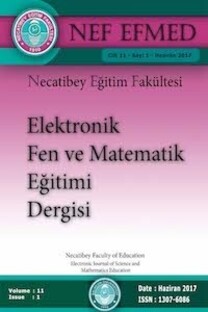The Effect of WebQuest-Supported Mathematics Instruction on Sixth Grade Students’ Critical Thinking Skills
___
- Aktaş Arnas, Y. (2013). Okul öncesi dönemde matematik eğitimi. Adana: Nobel Kitabevi. Aslan, D. & Aktaş Arnas, Y. (2007). Okul öncesi eğitim materyallerinde geometrik şekillerin sunuluşuna ilişkin içerik analizi. Ç.Ü. Sosyal Bilimler Enstitüsü Dergisi, 16( 1), 69-80.
- Aslan, D., Günay Bilaloğlu, R. & Aktaş Arnas, Y. (2006). Okul öncesi öğretmenlerinin günlük programda yer verdikleri matematik etkinliklerinin ve bu etkinliklerin uygulama biçimlerinin incelenmesi. Avrupa Birliği Sürecinde Okul Öncesi Eğitimin Geleceği Sempozyumu, Kıbrıs.
- Bulut, M. S. & Tarım, K (2005). Okul öncesi öğretmenlerinin matematik ve matematik öğretimine ilişkin algı ve tutumları. XIV. Ulusal Eğitim Bilimleri Kongre Kitabı, 959- 966.
- Carpenter, C. (1985). Math on the job. national center for research in vocational education. Ohio State Univ., Columbus.
- Carpenter, T.P., Carey, D.A., & Kouba, V. (1990). A problem solving approach to the operations. In J. Payne (Ed.), Teaching And Learning Mathematics For The Young Child. Reston, VA: National Council of Teachers of Mathematics.
- Carpenter, T.P., & Moser, J.M. (1983). The acquisition of addition and subtraction concepts. In R. Lesh ve M. Landau (Ed.), The Acquisition Of Mathematics Concepts And Processes. Orlando, FL: Academic Press.
- Despina, D. & Harikleia, L. (2014). Addition and subtraction word problems in greek grade a and grade b mathematics textbooks: distribution and children’s understanding. International Journal for Mathematics Teaching and Learning,8, 340.
- Ernest, P. (1989). The knowledge, beliefs and attitudes of the mathematics teacher: a model. Journal of Education for Teaching, 15(1), 13-33.
- Haylock, D. & Cockburn, A. (2004). Understanding mathematics in the lower primary years. London: Paul Chapman Publishing.
- Hill, H. C., Rowan, B. & Ball, D. L. (2005). Effects of teachers mathematical knowledge for teaching on student achievement. American Educational Research Journal, 42(2), 371- 406.
- Klibanoff, R. S. & Levine, S. C. (2006). Preschool children's mathematical knowledge: the effect of teacher "math talk". Developmental Psychology, 42 (1), 59–69.
- Nures, T. & Brgant, P. (2008). Children doing mathematics (S. Koçak çev.). İstanbul: Doruk yayıncılık
- Olkun, S. & Toluk, Z. (2002). Textbooks, word problems and student success on addition and subtraction. International Journal for Mathematics Teaching and Learning. Web üzerinde: http://www.ex.ac.uk/cimt/ijmtl/ijmenu.htm.
- Parmjit, S. (2006). An analysis of word problems in school mathematics texts: operation of addition and subtraction. Journal Of Scıence And Mathematics Education In S.E. Asıa, 29(1), 41-61.
- Parmjit, S. & Teoh, S. H. (2010). An analysis of addition and subtraction word problems in mathematics textbooks used in Malaysian primary school classrooms. Brunei Int.J.of Sci.& Math. Edu., 2(1), 68-85.
- Peterson, P. L., Fennema, E. & Carpenter, T. (1989). Using knowledge of how students think about mathematics. Educational Leadership, 46(4), 42-46.
- Sarama, J. & Clements, H.D. (2009). Early childhood mathemetics education research. New York and London: Routledge.
- Sperry Smith, S. (2001). Early childhood mathematics. U.S.A. : Allyn and Bacon.
- Tarım, K. & Deretarla Gül, E. (2003). Anasınıfı ve ilköğretim birinci sınıf öğrencilerinin toplama ve çıkarma becerilerinde kullandıkları stratejilerin incelenmesi. OMEP Dünya Konsey Toplantısı, Kuşadası, 1, 270-283.
- Thompson, A. G. (1984). The relationship of teachers’ conceptions of mathematics and mathematics teaching to ınstructional practice. Educational Studies in Mathematics, 5(2), 105-127.
- Umay, A. (2003). Okul öncesi öğretmen adaylarının matematik öğretmeye ne kadar hazır olduklarına ilişkin bazı ipuçları. Hacettepe Üniversitesi Eğitim Fakültesi Dergisi, 25, 195-203.
- Van De Walle, J. A. (2001). Elementary and middle school mathematics: teaching developmentally, 4th edition. New York: Addison Wesley Longman.
- ISSN: 1307-6086
- Yayın Aralığı: 2
- Başlangıç: 2007
- Yayıncı: Balıkesir Üniv. Necatibey Eğitim Fak.
MESUT SAÇKES, Kathy Cabe TRUNDLE
Şule SARIBAŞ, Yaşare AKTAŞ ARNAS
Türkiye’nin Pisa’daki Fen Başarısıyla İlişkili Faktörlerin İncelenmesi
Eda ERDAS KARTAL, Nihal DOGAN, Selda YILDIRIM
Determination of Factors Affecting the Science Anxiety Levels of Secondary School Students
Filiz AVCI, Fatma Gülay KIRBAŞLAR
Yansıtıcı Düşünmeye Dayalı Etkinliklerin Bilimsel Süreç Becerilerinin Gelişimine Etkisi
Filiz AVCI, Fatma Gülay KIRBAŞLAR
Development of A Learning Responsibility Scale
Ortaokul Öğrencileri İçin Matematik Sınavı Kaygısı Ölçeği: Bir Ölçek Geliştirme Çalışması
